A Consumer Guide to the Trailing Edge: June, 2013
Recycled Goods (#109)
by Tom Hull
My original plan was to follow up last month's 1960s-alt-themed guide with more '60s music: as I was working on May's column, I ran across some records that didn't really fit as "alt" but that I felt like checking out -- Cream records I knew well but never bothered to grade, Hollies albums I never heard, things I missed or only knew through later best-ofs like A Salty Dog and The Who Sings My Generation and a few late Coltranes. I collected about twenty such reviews, but barely scratched the surface, and as the calendar turned over I realized I didn't have enough time to cram it all together. Meanwhile, I had been kicking reviews that didn't fit into the July file, and had a package of Afro-Asian promos that I wanted to serve sooner rather than later. So I wound up flipping the two files. The 1960s will wait until July (or later). Meanwhile, I'll run this grab bag, which includes explorations of some Christgau favorites (Beautiful South, Rilo Kiley, Wussy), an early Oliver Lake I found while looking for his latest, and more Africana.
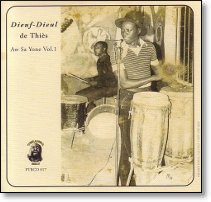 |
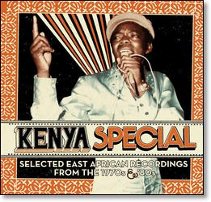 |
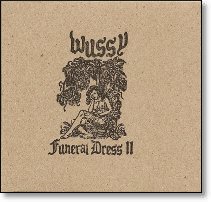 |
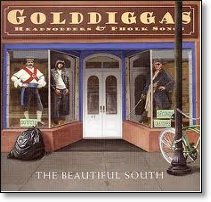 |
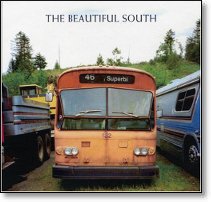 |
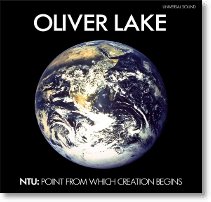 |
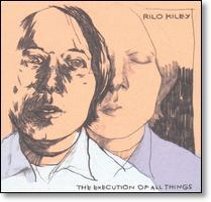 |
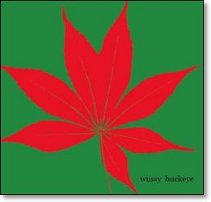 |
Tony Bennett/Dave Brubeck: The White House Sessions, Live 1962 (1962 [2013], Columbia/Legacy): Nothing new in their two short and separate sets, but both were riding their popular peaks, Brubeck opening with "Take Five" and Bennett closing with "I Left My Heart in San Francisco." Then they merge, Brubeck's Quartet replacing Ralph Sharon's trio, and it gets wilder, with a much fiercer Brubeck ready to rumble, keeping Bennett quick on his toes as he skitters through "Lullaby of Broadway," "That Old Black Magic," two more. B+(**) [advance]
Dieuf-Dieul de Thiès: Aw Sa Yone Vol. 1 (1981 [2013], Teranga Beat): From Thiès in Senegal, less cosmopolitan than Dakar where big things were happening, these sessions with guitarist Pape Seck and three griot-style vocalists were only released on cassette, and long forgotten, although the group kept trudging along -- I have a later disc of them backing up Tidiane. Even-tempered, a gentle groove that goes on and on, each little embellishment welcome, especially the sax. A-
Harafin So: Bollywood Inspired Film Music From Hausa Nigeria ([2013], Sahel Sounds): From Kano, with a metro area of close to three million people the capital of the Islamic north and the second largest city in Nigeria, home of a Hausa film industry that draws heavily on the musicals of Bollywood -- call it Kannywood. Nine songs credited to as many artists but possibly fewer producers -- one Abubakar Sani claims to have made 5000 songs ("3000 of them hits"); no dates given but the introduction of VHS in 1990 and the Yamaha PSR keyboard in 1994 were enabling technologies, the local talents mimicking the masters, the rhythmic roll turning over and over. B+(**)
Kenya Special: Selected East African Recordings From the 1970s & '80s (1970s-80s [2013], Soundway, 2CD): Obscure 45s from back in the day, 32 of them, closer in spirit and range to crate digs like John Storm Roberts' Before Benga 2: The Nairobi Sound than to the soukous-inflected Guitar Paradise of East Africa. Reportedly the full packaging includes a 40-page booklet, which my promo lacks. So I'm short on details, but the discs themselves jump. A- [advance]
Sedayeh Del: Funk, Psychedelia and Pop From the Iranian Pre-Revolution Generation (1959-77 [2013], Pharaway Sounds): Main hint on dates is the note that Karim Charmanara's Abang e Rooz label was founded in 1959 (releasing 200 singles and 3 LPs that year) and folded in 1977, but I'd guess this leans toward the 1970s. The fourth compilation in a series, a mix of Persian grandiosity -- I wouldn't call anything under the Shah a "golden age," but it sure had gilded pretensions -- and pop moves, imported from Bollywood as well as the West, but something else. B+(***)
The Rough Guide to Acoustic Africa (2000-12 [2013], World Music Network, 2CD): Lazy picks, all but one picked off the shelf from the label's Riverboat subsidiary, which at least makes them easy to date (approximately) -- some also on the label's Unwired and Oxfam comps -- spanning a big continent from South Africa and Mozambique to Senegal and Sudan. The acoustic shtick undercuts the vast stylistic differences across the continent, helping the flow, whiel the vast stylistic range ensures that any dull spots will be followed by something more interesting. Second disc is a "bonus" by Senegalese kora player Noumoucounda Cissoko, evidently -- unlike most of the label's recent 2CD packages -- unavailable on its own. Its string flurry grabs your attention right off, and the songs start to add up, tossing the occasional curve like piano solos and Tumi Molekane's rap. B+(**) [R]
The Rough Guide to African Disco (1976-2010 [2013], World Music Network, 2CD): Sure, it's all dance music, but sort of misses the point and the moment, ranging from Osibisa pleasantries to Manu Dibango to the Mahotella Queens, back to Nigeria-Cameroon then London again for the Sofrito remixes -- too much jumble, not that Teaspoon & the Waves' "Oh Yeh Soweto" isn't a find. More antiquated, the bonus disc is Maloko's Soul on Fire, from the 1980s with Cameroonian vocalist Victor Nguini running through American soul covers like "Stand by Me" and "In the Midnight Hour," given a slight soukous inflection by guitarist Syran Mbenza. B+(*) [R]
Wussy: Funeral Dress II (2011, Shake It): Cincinnati alt-rock band, two singer-songwriters Chuck Cleaver and Lisa Walker make a fine proximate couple -- hard to overstate how much Christgau's coterie love them but the only album I managed to own -- their second, Left for Dead -- never did much for me, though I've streamed a couple albums I was more impressed by, including the original 2005 Funeral Dress. Still, I don't know it well enough to make any of the songs on this unplugged Record Store Day limited edition old friends, or even recognizable. Which I guess makes them seem like new to me. The balance and craft are certainly there. Beyond that, I'm not quite sure I'm not just swept away with other folks' enthusiasm. A- [R]
Briefly Noted
The Beautiful South: Golddiggas: Headnodders & Pholk Songs (2004, Sony Music [UK]): A marvelous band from the start, or even earlier if you count the two Housemartins albums equally stamped by Paul Heaton's vocals, huge in England without any notable success in the US; covers album, mostly rock tunes from the 1970s, nothing obvious either as roots or affectation, in arrangements that sneak up on you. A- [R]
The Beautiful South: Superbi (2006, Sony/BMG [UK]): Ninth (and last) album, never got a US release and didn't bowl them over in the UK either, but not for lack of songs -- the first half, up through "Meanwhile," are memorable from the start, the possible knock on the rest is that they may be too jaunty for a singer as deep as Paul Heaton -- not that I ever mind Alison Wheeler. A- [R]
The Beautiful South: BBC Sessions (1989-98 [2007], UMVD, 2CD): Live sets, four cuts from 1989 when they were getting started, four more from 1998 showcasing their sixth album, and two much longer 1994 sessions, probably timed for their fourth album and the best-of Carry On Up the Charts; the first simplifies, the latter shows they can stretch out and work the crowd, in between they remind you how many great songs they had, although they also repeat a couple too many times and skip a lot more; if this is all the archaeologists ever find, they'll grade it higher. B+(**) [R]
Bola: Volume 7 (2009 [2012], Awesome Tapes From Africa): From Ghana, a real shouter, his vocal intensity strikes me as call-without-response, unless you consider the slinky kologo that finishes every line more than denouement; the songs merge together in this effect, driven relentlessly forward on dancing drums. B+(***) [R]
Colomach: Colomach (1974 [2013], Soundway): North Nigerian group, led by Gneni Mamadou from Togo, closer in spirit to Mali and the Sahara than to the juju and Afrobeat of the southern cities; limited edition vinyl, should protect its obscurity quotient. B+(*) [R]
Tommy Flanagan/Jaki Byard: The Magic of 2: Live at Keystone Korner (1982 [2013], Resonance): Two major pianists, live, start out with duets on standards (first three: Charlie Parker, Cole Porter, Duke Ellington), later on alternating solos. Bright and tinkly, Flanagan seems more at home with the material. B+(*)
The Funkees: Dancing Time: The Best of Eastern Nigeria's Afro Rock Exponents 1973-77 (1973-77 [2012], Soundway): Afrobeat, doesn't have to be any funkier than its models, at least when we're talking James Brown and Fela Kuti, but could use a bit of charisma, something the models have in spades; compilation runs long and rarely lets up or lets you down. B+(**) [R]
Oliver Lake: NTU: Point From Which Creation Begins (1976 [2012], Universal Sound): Early, coming out of St. Louis and thinking Africa, ten musicians with electric bass and piano, congas and toys, but plenty of brass when they need it, John Hicks on piano, and surprising guitar by someone named Richard Martin. A- [R]
Rilo Kiley: Take Offs and Landings (2001, Barsuk): First album by a group led by two former child actors: Blake Sennett, who tended to take things idiosyncratically, and Jenny Lewis, who had a way of making those oddities seem normal; all the components of a great group here, sometimes oversimplified, but sometimes that's the charm. B+(***) [R]
Rilo Kiley: The Execution of All Things (2002, Saddle Creek): Second group album, did much better on a second play that followed the first album; doubt if it's neglected masterpiece, but it offers a lot more than juvenilia too, the whispers and tinkles picking up guitar riffs and innuendo and an outright "it's so fucking beautiful"; ready for prime time: "Spectacular Views." A- [R]
Wussy: Buckeye (2005-11 [2012], Damnably): A 17-cut Europe-only best-of, or intro, condensing four albums -- unless they snuck in an alternate version, something I can't tell -- but that works fine for me, the non-chronological shuffle mixing it up; fans prefer the albums, but if this were readily available it might be all I need -- more hooks, rocks harder too. A [R]
Legend: B+ records are divided into three levels, where more * is better. [R] indicates record was reviewed using a stream from Rhapsody ([X] is some other identified stream source; otherwise assume a CD). The biggest caveat there is that the packaging and documentation hasn't been inspected or considered, and documentation is especially important for reissues. But also my exposure to streamed records is briefer and more limited, so I'm more prone to snap judgments -- although that's always a risk.
For this column and the previous 108, see the archive. Total records reviewed: 3685 (3241 + 444).
Additional Consumer News
Notes
Copyright © 2013 Tom Hull.